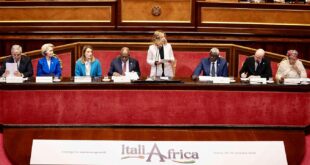The Dutch government has declared the head of the Eritrean embassy’s office in The Hague ‘persona non grata’ and has demanded his immediate departure. The decision followed a motion issued by the Dutch parliament to close the consulate.
The decision to expel Tekeste Ghebremedhin Zemuy, Eritrea’s Chargé d’Affaires in the Netherlands, was made after reports of the intimidation and coercion, especially connected to the collection of the 2% Eritrean diaspora tax, stirred political controversy in the Netherlands. In addition, the Dutch government was shocked by evidence of coercion to pay the tax and to sign a ‘regret form’ recorded by Dutch radio programme Argos.
Dutch Foreign Minister Halbe Zijlstra announced the Netherlands’ decision on Wednesday to expel Eritrea’s top diplomat in the country, noting that the move did not mean the closure of Eritrea’s consulate in The Hague.
Although the Dutch government did not decide to close the embassy office outright, they state that declaring the Chargé d’Affaires persona non grata is a very strong diplomatic measure. This highly exceptional measure was taken in order to give “a signal to the Eritrean authorities”, according to the Ministry of Foreign Affairs. “The Cabinet wants to make clear that the Netherlands does not accept these undesirable practices.”

A week before Christmas, the Dutch Parliament debated the issue of the 2% diaspora tax that Eritreans have to pay. MPs indicated that their patience regarding the continued reports of involvement by the Eritrean embassy had run out. These reports included embassy involvement in the collection of the 2% tax in combination with coercion and threats.
Two members, supported widely by other Parliamentarians, issued a motion to close the Eritrean embassy in response to the apparent lack of progress despite earlier measures such as summoning the Eritrean ambassador from Brussels – who serves the Netherlands as well as Belgium.
Adding to the controversy, Dutch radio programme Argos published a conversation between the head of the Dutch embassy office and an Eritrean asylum seeker. In the conversation, Tekeste Ghebremedhin Zemuy, Eritrea’s Chargé d’Affaires in the Netherlands, can be heard telling the man that he cannot get consular services unless he signs a ‘regret form’ for his crimes, which includes an open-ended acceptance of any punishment, and pays the 2% diaspora tax over his income in the 4-5 years that he has lived outside of Eritrea. When the asylum seeker indicates that he does not want to do this, he is told that “anybody who wants anything from the country” has to comply.
Following the airing of the radio programme, the Eritrean ambassador was summoned to The Hague. It is to be understood from the letter than this conversation yielded insufficient results, upon which the Chargé d’Affaires in the Netherlands was declared persona non grata.
About 20,000 Eritrean refugees, who fled a government crackdown and poverty at home, live in the Netherlands.
Sola Jolaoso with EEPA report
 THE AFRICAN COURIER. Reporting Africa and its Diaspora! The African Courier is an international magazine published in Germany to report on Africa and the Diaspora African experience. The first issue of the bimonthly magazine appeared on the newsstands on 15 February 1998. The African Courier is a communication forum for European-African political, economic and cultural exchanges, and a voice for Africa in Europe.
THE AFRICAN COURIER. Reporting Africa and its Diaspora! The African Courier is an international magazine published in Germany to report on Africa and the Diaspora African experience. The first issue of the bimonthly magazine appeared on the newsstands on 15 February 1998. The African Courier is a communication forum for European-African political, economic and cultural exchanges, and a voice for Africa in Europe.

































